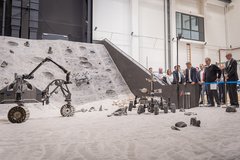Under the leadership of Prof. Dr. Dr. h.c. Frank Kirchner (Head of the DFKI Robotics Innovation Center and Managing Director of the Bremen site) and Prof. Dr. rer. nat. Bernd Mayer (Director of the Fraunhofer IFAM institute), the tour led through the unique research infrastructure of the DFKI building, including the Maritime Exploration Hall, which is unique in Europe and is used to test innovative maritime robotics. The Federal Minister gained comprehensive insights into the research work and technology development of the two Bremen institutes.
Robert Habeck remarked during his visit: "The Robotics Innovation Center of DFKI links the future fields of Artificial Intelligence and Robotics and shows how complex robotic systems can advance research and expand our horizons in the water and in the air. The close cooperation with Fraunhofer IFAM is proof that the German research landscape does not think in islands, but seeks and finds solutions together and across the board. We are seeing how a diverse robotics and AI scene is establishing itself here in Bremen through the proximity of innovative companies and research institutions, which is developing forward-looking technology."
Artificial Intelligence allows highly complex applications under and above water
Solutions developed at the Robotics Innovation Center include Autonomous Underwater Vehicles (AUVs), which are designed to perform maintenance and inspection work on offshore wind farm installations, green hydrogen production terminals or aquaculture facilities, or to assist in the salvage of munitions waste on the seabed.
"In the future, by using Artificial Intelligence methods, robotic systems will be able to perform highly complex data analysis and manipulation operations on dangerous or sensitive objects and infrastructures in environments hostile to humans with consistent precision and over long periods of time. As a result, they represent a key technology to address a wide range of scientific, environmental and economic challenges," said Robotics Innovation Center Director Prof. Dr. Frank Kirchner. "By advancing these technologies, we are helping to set standards for working in environmentally sensitive areas and giving Germany a technological competitive edge over its international rivals," Kirchner stated.
Regular excursions in the Atlantic as well as in the North and Baltic Seas under real conditions guarantee an application-related performance evaluation of the solutions developed at DFKI. This unique combination of laboratory infrastructure and real missions enables the development of robust and reliable robotic systems.
Maritime Test Center Helgoland as a real lab for mobile robots
Research on the open sea has so far only been possible under elaborate conditions. For this reason, Fraunhofer IFAM, in collaboration with DFKI, operates the Maritime Test Center Helgoland as a development and testing environment for mobile robotics in the maritime sector. "With the test center for maritime technologies on Helgoland and a marked out sea area not far off the high sea island, there is a unique research area to develop surface and underwater technologies under real conditions and to test them both in long-term experiments and in short-term test scenarios. In this real laboratory, developments from mobile robotics can demonstrate their reliability in sea states, currents, sediment loads, high wind speeds, and under limited visibility," explained Prof. Bernd Mayer, Institute Director of Fraunhofer IFAM.
Inspection work on wind turbines with offshore drones
Another important task concerns the expansion of wind turbines off the coasts and the equally growing market for inspection and maintenance work. Performing these demanding services safely, reliably and economically, and implementing modern digital methods in the process, offers optimal application potential for unmanned aircraft systems (UAS for short); at the same time, this relieves humans of complex work in challenging environments.
"With the 'Offshore Drone Campus Cuxhaven - ODCC for short', Fraunhofer IFAM has created a test and development infrastructure for unmanned aerial systems in offshore use. The new location offers local and technical possibilities to further develop offshore drones together with scientific partners and industry. Research focuses on the safe and efficient use of drones for offshore work such as maintenance, inspection, repair or surveying, as well as the development of new propulsion and material protection concepts for the demanding use of the aircraft under offshore conditions," says Bernd Mayer.
During his visit to DFKI, Robert Habeck also had the opportunity to observe the AUV DeepLeng docking autonomously with an underwater station in the large test basin of the Maritime Exploration Hall, to visit the 17-meter-high multifunctional hall with artificial crater landscape, and to get an idea of various robotic systems for a wide range of applications, including a semi-autonomous walking excavator weighing over 12 tons for use in contaminated areas.
(Joint press release of DFKI and Fraunhofer IFAM)
Contact DFKI Bremen:
Prof. Dr. Dr. h.c. Frank Kirchner
German Research Center for Artificial Intelligence GmbH (DFKI)
Managing Director DFKI Bremen
E-mail: frank.kirchner[at]dfki.de
Tel: +49 421 178 45 4101
Contact Fraunhofer IFAM Bremen:
Prof. Dr. Bernd Mayer
Institute Director
Fraunhofer Institute for Manufacturing Technology and Applied Materials Research IFAM
Phone + 49 421 2246-401
bernd.mayer[at]ifam.fraunhofer.de
DFKI Press Contact
Team Communications & Media Bremen
E-Mail: communications-hb[at]dfki.de
Tel.: 0421 178 45 4180
Fraunhofer IFAM Press Contact
Press and Public Relations
E-mail: martina.ohle[at]ifam.fraunhofer.de
Tel.: 0421 2246 256




